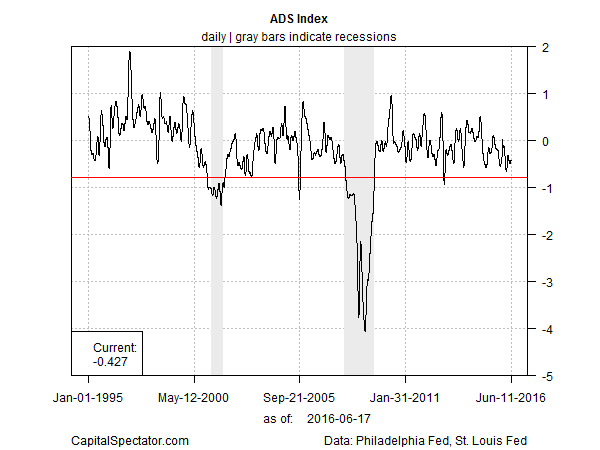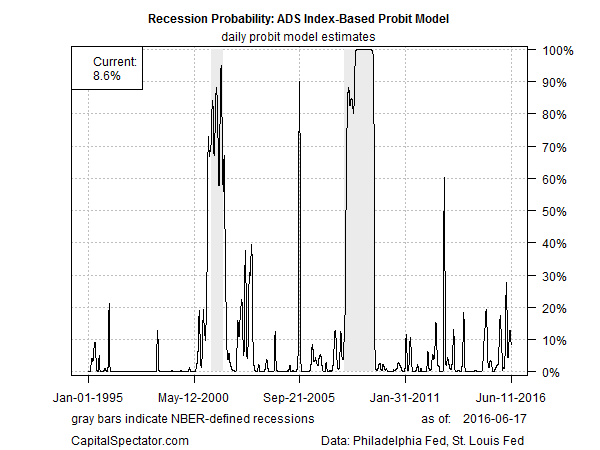Recession chatter is on the rise lately. "After seven years of expansion, the U.S. economy appears to be headed for a recession," writes an economics lecturer at Yale. Meanwhile, Bloomberg this week advised that US recession odds increased to 55% due to a flattening yield curve. And a survey of 400 real estate professionals shows that a majority expect a recession within the next 18 months. The dark forecasts may be right - or wrong. Based on the available data to date, however, the probability is still low that the US economy has fallen into an NBER-defined recession in the recent past.
It's debatable if the conventional distinction between growth and recession has any relevance these days as the US struggles with slow growth and uneven prospects for anything better. But as a baseline case for benchmarking macro analysis, it's reasonable to consider how the numbers stack up in broad terms through a relatively objective lens. There are many ways to proceed, including the Philly Fed's frequently updated ADS Index, which tracks six indicators, including yesterday's numbers on initial jobless claims. Although this gauge is at the lower end of the range in recent months, the ADS Index-based on economic activity through June 11 - has yet to cross over to the dark side.
Although the Philly Fed doesn't offer clear guidelines on how to interpret the ADS data (other than noting that lower values reflect weaker output), a 2010 study by the San Francisco Fed - "Diagnosing Recessions" - estimates the tipping point at -0.80 for this index. By that measure, the current ADS reading of -0.42 (based on data published June 16 for economic activity through June 11) still points to growth.

Let's also look at the ADS data through the prism of a probit model and compare the index's history with the NBER's daily recession signals since 1960. This statistical procedure analyzes the relationship between the two data sets and estimates the probability of a new recession based on the current ADS data. Here, too, the numbers point to a low probability - roughly 9% - that a new recession has started in the recent past. (For clarity, the chart below only shows the probit results since 1995.)

There's no guarantee, of course. Estimating recession risk in real time is an imperfect science. But it helps quite a bit if we consider a variety of metrics and monitor the evolving numbers regularly. Fortunately, there are several datasets that offer perspective on how the US economy is faring (see The US Business Cycle Risk Report for details).
Every business cycle benchmark has its own set of pros and cons. One of the advantages of the ADS Index: frequent updates. The downside is that there's more noise in a high-frequency index vs. a slower-moving benchmark, such as the Chicago Fed's National Activity Index.
The good news is that most multi-factor macro indexes for the US still reflect a growth bias. Granted, the bias has stumbled lately, which may or may not presage deeper trouble in the weeks and months ahead. But before we start speculating on what could happen, which is inherently a guessing game, it's useful to know what a spectrum of indicators are telling us about recent economic activity. By that standard, there's still no sign of a slump, based on published figures to date.
Does that mean that the US won't slip into a new recession in the near-term future? No, of course not. No amount of statistical work can ever make such a claim - at any time. But it's all about the numbers and so whenever someone tells you that a new recession is lurking around the next bend, it's reasonable to ask: Can you show me the numbers, the model, and the track record to back up your forecast?
















.jpg)





